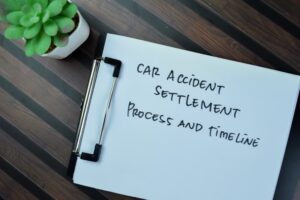How Much to Expect from a Car Accident Settlement
If someone else caused a car accident in Florida that injured you, you might need a settlement to cover your medical bills, lost income, and more. It’s tough to say precisely how much to expect from a car accident settlement.
The amount you could recover depends on your unique situation. The good news is, you don’t have to figure this out alone. A car accident lawyer can help you understand the value of your claim and fight for the maximum amount you deserve.
An experienced car accident lawyer is familiar with car accident settlements and skilled at negotiating with the insurance company. They will factor in your economic losses like medical costs and lost wages, and noneconomic damages like pain and suffering.
Don’t try to handle your car accident claim on your own. Contact a personal injury lawyer with experience handling car accidents today to find out how much compensation you’re entitled to.
Compensation Available from a Car Accident Settlement
 Each car accident case is unique, so the compensation you can claim will vary depending on the circumstances. There is no cookie-cutter typical car accident settlement. The compensation you can claim will vary depending on the circumstances.
Each car accident case is unique, so the compensation you can claim will vary depending on the circumstances. There is no cookie-cutter typical car accident settlement. The compensation you can claim will vary depending on the circumstances.
However, many car accident victims include the following compensable losses in their settlements:
Economic Damages
- Medical Expenses: These are the costs you incur for medical care related to your injuries from the accident. This includes immediate treatments, like emergency room visits, as well as ongoing care, such as physical therapy. You can claim compensation for both past medical bills and the projected costs of medical care you will likely need.
- Lost Income: If your injuries prevent you from working, you could claim money for income losses. This includes the money you would have earned from the time of the accident until you can return to work. If your injuries are severe enough to affect your ability to work in the future, you could also claim lost earning capacity.
- Property Damage Costs: This compensation covers repairing or replacing your vehicle and any personal items that sustained damage in the accident. If you had valuable items inside your vehicle, you could also include these losses.
Non-Economic Damages
- Pain and Suffering: This is compensation for the physical pain and emotional distress you suffer due to the accident. This loss is more challenging to quantify than medical bills, but it’s just as important. Pain and suffering compensation varies based on the severity of your injuries and how they affect your daily life after the accident.
- Loss of Quality of Life: If your injuries prevent you from enjoying daily activities and hobbies that were a part of your life before the accident, you could seek compensation for lost quality of life. This category acknowledges that not all injuries are physical and that quality of life matters.
- Loss of Consortium: This type of compensation addresses the losses of the spouse of someone who suffers harm in an accident. It compensates loved ones for the losses of companionship, support, and relationship quality due to crash injuries.
Types of Insurance Claims You Could File After a Car Accident
Understanding the different types of insurance coverage is useful when dealing with the aftermath of a car accident. Each of the following types of insurance serves a distinct purpose and offers specific benefits that can provide financial relief in various scenarios.
The Other Driver’s Liability Insurance
Liability insurance covers other people’s injuries, medical bills, and property damage costs when the policyholder is responsible for the accident.
In many states, the liability insurance of a driver liable for an accident will pay for the accident victim’s losses, assuming the at-fault driver has coverage. If so, you will file a claim against the at-fault party’s policy to seek compensation.
Many states require all drivers to carry specific minimum liability coverage amounts, so it’s an essential source of compensation for many crash victims.
However, some states do not require drivers to carry any liability insurance, so you should speak to a lawyer as soon as possible after a crash to determine your options for seeking compensation.
Personal Injury Protection (PIP) or Medical Payments (MedPay) Insurance
Personal injury protection (PIP) and medical payments (MedPay) are optional coverages that kick in when policyholders incur accident-related medical expenses. They both provide no-fault insurance coverage, which means they pay for a policyholder’s medical bills regardless of fault for an accident.
While these types of insurance are similar, PIP is slightly more robust than MedPay. In addition to medical bills, it can also compensate for income losses if your crash injuries prevent you from working. In some cases, it can even cover your deductibles for other types of insurance. However, only a few states require PIP while others make it optional, and you cannot even buy it in others.
Uninsured Motorist (UM) or Underinsured Motorist (UIM) Insurance
Uninsured motorist or UM coverage is for scenarios where the at-fault driver has no insurance. UM coverage also pays for hit-and-run accidents where the at-fault driver flees the scene.
On the other hand, underinsured motorist (UIM) coverage is applicable when the other driver has insurance but not enough to cover all of your accident-related costs. In that case, UIM coverage would kick in.
Some states require drivers to purchase UM or UIM insurance, but many don’t. Always check your auto insurance policy as soon as possible after an accident to determine whether this type of coverage is available to you. It can provide significant relief when you can’t rely on the other driver’s insurance policy for compensation.
Health Insurance
Some health insurance plans cover medical costs arising from car accident injuries. Your health insurance might cover your immediate and ongoing medical treatment if you’re in an accident. Usually, however, a person must exhaust all other coverage sources before using health insurance benefits after a car accident.
Furthermore, if your health insurance pays for your treatment, the insurer might seek reimbursement from you if you later receive a settlement from another insurance policy. This is because of the health insurance company’s right to subrogation, which is the ability to recoup what they have paid from the at-fault party.
Types of No-Fault Insurance Coverage
Collision and comprehensive insurance are types of no-fault coverage that pay for vehicle damage after an accident. Collision insurance is specifically for repairs to a policyholder’s vehicle in the event of an accident with another vehicle. It may also reimburse a policyholder for the value of their vehicle if it is a complete loss due to the accident.
Collision insurance will allow you to repair your car without depending on another person’s insurance policy, which might be unavailable or insufficient in certain situations.
On the other hand, comprehensive insurance covers unexpected non-collision incidents that damage your vehicle. Examples include theft, vandalism, or natural disasters. After such events, you can file a claim against your comprehensive insurance to cover the costs of vehicle repairs.
Factors That Could Affect Your Car Accident Settlement
Several factors can influence the amount you receive for your car accident settlement. It’s not a straightforward calculation but a complex consideration of various aspects of the accident and their repercussions on your life. Understanding these factors allows you to gauge the potential car accident settlement value and determine how much you should ask for in a car accident settlement.
Here’s an overview of what might affect an average car accident settlement:
- The Severity of Your Injuries: The nature and severity of your injuries are among the most influential factors. Serious injuries that require extensive medical treatment, result in permanent disabilities, or have long-lasting effects on quality of life would likely increase a settlement’s value. Injuries that lead to chronic pain or lifestyle changes weigh heavily in negotiations.
- How Much Your Treatments Cost: Settlements often reflect the total amount of medical expenses a plaintiff incurs due to an accident. This includes emergency care costs, surgical procedures, hospitalizations, medications, therapies, and long-term care needs. If you need ongoing treatment, you can add these projected costs to your settlement calculation.
- How Much Income You Lose: If your injuries prevent you from working, you can consider your current and future income losses as part of your claim. This includes income you’ve already lost and money you will be unable to earn in the future due to your injuries. Relevant factors include your pre-accident pay rate and ability to earn in the same capacity as before.
- How the Accident Affects Your Daily Life: The accident’s effect on your day-to-day activities is another essential factor. This includes how the accident affects your ability to engage in hobbies and perform daily routines. Your settlement could increase depending on the extent of any inconvenience, pain, suffering, or lost enjoyment of life you experience.
- Fault and Liability: The determination of who is at fault for the accident can significantly affect your potential settlement value. Strong evidence showing the other party is at fault makes you more likely to recover a larger settlement. However, if the evidence is inconclusive or the other party accuses you of fault, it could significantly reduce your claim value.
- Insurance Policy Limits: The insurance policy limits of the at-fault driver could cap your settlement amount. If the limits are high, there’s a larger potential payout. However, if the other driver’s policy has low limits and your expenses exceed them, the settlement amount might not fully cover your losses. If so, pursuing money through other means might be necessary.
How Long Will It Take to Receive My Settlement?

The time it takes to receive a settlement after a car accident can vary considerably. It often depends on the complexity of the case, who is at fault, and the extent of the injuries.
If the fault is apparent and your injuries are relatively minor, a settlement could arrive quickly, sometimes within a few weeks. However, if the wreck causes serious injuries or there is a dispute over who is at fault, it could take much longer.
Negotiations with insurance companies often prolong the process. Insurance adjusters review all available details after an accident, which can take time, especially if they challenge the claim. Litigation can add even more time. If you file a car accident lawsuit, resolving your claim could take months or even years.
Each party’s willingness to cooperate also affects the timeline for your settlement. If everyone cooperates and agrees on the settlement, a resolution may come about more quickly. However, protracted negotiations will likely extend the timeline if either side disagrees with the determination of fault or the settlement amount.
In general, you can expect to wait a few months to a year for most settlements to conclude. Remember that every case is different. Your attorney can provide the best estimate based on the specifics of your case.
Instead of a speedy settlement, allow your lawyer to address every aspect of your case so you receive a fair payout rather than accepting a low-ball offer.
How Do I Claim the Money After I Settle?
After you reach a settlement for a car accident, you generally have two options to collect your money: a lump sum payment or a structured settlement.
With a lump sum payment, you receive all your money at once. This is the more straightforward option. Once you sign the agreement and the insurance company processes it, they issue a check for the appropriate amount. You get the full settlement quickly, which is helpful if you have immediate expenses.

A structured settlement is different. Instead of getting all your money at once, you receive it in a series of payments over time. You can set up these payments to come monthly, yearly, or at other specified intervals. Many people like this method because it provides a steady income stream and possible tax benefits.
To start collecting your settlement money, you sign the agreement from the insurance company. Then, the insurer will process the payment according to the terms you both accepted.
For lump sum payments, the check usually arrives within a few weeks. For structured settlements, you will start receiving the payments per your schedule. This could be almost immediately or set for a future date.
Your personal injury lawyer will guide you through every step of this process to ensure the insurance company follows through on your settlement agreement. They will also review the settlement terms carefully before you agree to anything to ensure the deal will meet your ongoing and future needs.
Car Accident FAQ
1. What should I do immediately after a car accident?
After a car accident, ensure everyone’s safety, call emergency services, and report the accident to the police. Obtain an accident report and seek medical attention, even if you have only minor car accident injuries.
2. How do I know if I need a car accident lawyer?
If you’ve sustained personal injuries, such as a neck injury, or if the accident involved significant property damage, it’s wise to consult an experienced personal injury lawyer. They can help you navigate the complexities of car accident cases and ensure you receive a fair settlement.
3. Can I handle a minor car accident claim on my own?
For minor car accidents with no injuries and minimal damage, you might handle the claim independently. However, if there are personal injuries or disputes about fault or damages, consulting a law firm can be beneficial to protect your interests.
4. What types of compensation can I receive after a car accident?
Compensation can include medical expenses, lost wages, pain and suffering, and property damage. An experienced personal injury lawyer will help you pursue a fair settlement for all your losses.
5. How long do I have to file a claim after a car accident?
The time limit to file a claim, known as the statute of limitations, varies by state. It’s essential to contact a law firm promptly to ensure you meet all deadlines and preserve your right to compensation.
6. What if the other driver’s insurance company offers me a settlement?
Before accepting any offer, consult with a personal injury lawyer. Insurance companies often aim to minimize payouts. An experienced lawyer will evaluate the offer and negotiate on your behalf to secure a fair settlement.
7. How can a lawyer help me with a rear-end car accident?
A lawyer can assist in gathering evidence, proving fault, and documenting your injuries. They will handle communications with insurance companies and work towards obtaining the compensation you deserve for your rear-end car accident.
8. What kind of personal injuries qualify for a car accident claim?
Common personal injuries in car accident cases include whiplash, neck injuries, broken bones, and head trauma. Even seemingly minor injuries can have long-term impacts, making it crucial to seek legal advice.
9. Why is it important to have an accident report?
An accident report provides a detailed account of the incident, including involved parties, witnesses, and contributing factors. It is a critical piece of evidence in establishing fault and supporting your claim.
10. How do I choose the right car accident lawyer?
Look for a law firm with a strong track record in personal injury law, particularly car accident cases. An experienced personal injury lawyer should offer a free consultation, work on a contingency fee basis, and have positive client reviews.
Contact Boohoff Law for Your Car Accident Claim
Notify your insurance company after an auto accident, but don’t try to negotiate before calling an experienced car accident lawyer. Our legal team will put their resources to work for you. We will work to secure the car accident compensation you deserve to make you whole again.
Free Consultation
We Are Here For You 24/7
Reviews
– Elissa M.
“Really pleased with Boohoff Law! Received immediate responses when I had any questions. Treated amazingly by all staff … made this process a true breeze!”
– Caitlyn M.
– Brandy K.
Related Posts
Top 10 Most Dangerous Intersections in Tampa for Car Accidents
How Do Most Bicycle Accidents Happen?
What are the Most Common Types of Bicycle Accidents?
Recovery is personal.
We’re here for you.
We’re close by. And if you can’t make it to us, we’ll meet you where you need us, at home or in the hospital.
You're better off with Boohoff.











The information on this website is for general information purposes only. Nothing on this site should be taken as legal advice for any individual case or situation. This information is not intended to create, and receipt or viewing does not constitute, an attorney-client relationship.
Disclaimer: The results and testimonials presented on this website are based on the unique facts and circumstances of each case. Past results do not guarantee or predict similar outcomes in future cases. Every legal matter is different, and you should not rely on prior case results as an expectation of future performance.
available 24/7
(877) 999-9999
